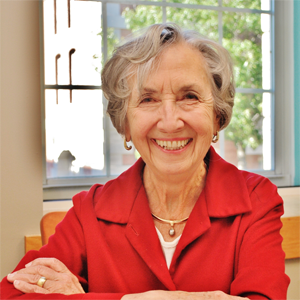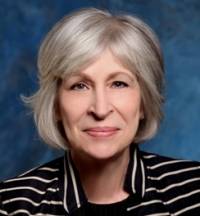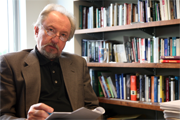 Dr. Sarah Blanton is an Associate Professor of Rehabilitation Medicine at Emory University School of Medicine, Division of Physical Therapy. She graduated from the University of Virginia in 1987 with a BA degree in biology, from Emory University in 1992 with her masters in physical therapy and received her clinical doctorate in physical therapy in 2003. She has a specialty certification in Neurology through the American Board of Physical Therapy. After nine years working in neurologic rehabilitation at Emory Center for Rehabilitation Medicine, she served as project coordinator for several research studies, including two multi-site, NIH-funded national clinical trials. In 2006, Dr. Blanton joined the faculty of the Emory Doctor of Physical Therapy program and her teaching has included geriatrics, mental health, cultural diversity and neurorehabilitation. Dr. Blanton’s current research focus includes stroke survivor and family quality of life, including depression, fatigue, caregiver/family functioning and post-stroke education. The long-term goals of her research efforts are to develop methods to support family focused rehabilitation approaches that facilitate the active integration of the caregiver throughout physical therapy practice.
Dr. Sarah Blanton is an Associate Professor of Rehabilitation Medicine at Emory University School of Medicine, Division of Physical Therapy. She graduated from the University of Virginia in 1987 with a BA degree in biology, from Emory University in 1992 with her masters in physical therapy and received her clinical doctorate in physical therapy in 2003. She has a specialty certification in Neurology through the American Board of Physical Therapy. After nine years working in neurologic rehabilitation at Emory Center for Rehabilitation Medicine, she served as project coordinator for several research studies, including two multi-site, NIH-funded national clinical trials. In 2006, Dr. Blanton joined the faculty of the Emory Doctor of Physical Therapy program and her teaching has included geriatrics, mental health, cultural diversity and neurorehabilitation. Dr. Blanton’s current research focus includes stroke survivor and family quality of life, including depression, fatigue, caregiver/family functioning and post-stroke education. The long-term goals of her research efforts are to develop methods to support family focused rehabilitation approaches that facilitate the active integration of the caregiver throughout physical therapy practice.
Dr. Blanton’s interest in the Journal of Humanities in Rehabilitation stems from her ongoing exploration of the intersections of creativity and spirituality to gain insight into the human experience of suffering, joy and mystery. In her teaching, she has found the use of narrative to be an exceptionally powerful tool to foster reflection and personal insight for both students and patients. In her research, she is incorporating multi-media formats to develop family education interventions in the home environment. A photographer since childhood, she has enjoyed sharing her artwork through exhibits at Emory University, speaking with chaplaincy students on “Reflections of Art and Spirituality in Appalachia” and as a guest contributor to the Public Radio show, On Being.
 Dr. Carey received BS and MS degrees in Physical Therapy and a PhD in Physical Education/Kinesiology all from the University of Minnesota. He currently is a Professor in the Program in Physical Therapy at the University of Minnesota. He has held previous faculty positions in Physical Therapy at the University of Puget Sound (1978-79), College of St. Scholastica (1979-80), University of Minnesota (1980-88 and 1994-present), and Mayo School of Health-Related Sciences (1988-1994). He teaches anatomy and principles of motor recovery from stroke. His research focuses on transcranial magnetic stimulation to promote recovery of hand function following stroke. He is a member of the University of Minnesota’s Academy of Distinguished Teachers and the Medical School’s Academy of Medical Educators, as well as being a Catherine Worthingham Fellow in the American Physical Therapy Association. His interest in the Journal of Humanities in Rehabilitation stems from working with people with stroke and his prior volunteering at the Center for Victims of Torture in Minneapolis, Minnesota.
Dr. Carey received BS and MS degrees in Physical Therapy and a PhD in Physical Education/Kinesiology all from the University of Minnesota. He currently is a Professor in the Program in Physical Therapy at the University of Minnesota. He has held previous faculty positions in Physical Therapy at the University of Puget Sound (1978-79), College of St. Scholastica (1979-80), University of Minnesota (1980-88 and 1994-present), and Mayo School of Health-Related Sciences (1988-1994). He teaches anatomy and principles of motor recovery from stroke. His research focuses on transcranial magnetic stimulation to promote recovery of hand function following stroke. He is a member of the University of Minnesota’s Academy of Distinguished Teachers and the Medical School’s Academy of Medical Educators, as well as being a Catherine Worthingham Fellow in the American Physical Therapy Association. His interest in the Journal of Humanities in Rehabilitation stems from working with people with stroke and his prior volunteering at the Center for Victims of Torture in Minneapolis, Minnesota.
 Dr. Bruce Greenfield is an Associate Professor in the Division of Physical Therapy and the School of Medicine and Senior Fellow in the Center for Ethics at Emory University. Dr. Greenfield is a well-known physical therapy educator and qualitative researcher. He serves on the APTA Ethics and Judicial Committee, and on the editorial boards of the Journal of Physical Therapy Education and the Journal of Orthopedic and Sports Physical Therapy. At Emory, Dr. Greenfield is a member of the Emory University Hospital Ethics Committee. For many years, Dr. Greenfield was an orthopedic clinical specialist and edited two text books on the rehabilitation of the knee and shoulder published by F.A. Davis. His current areas of research are exploring the use of narrative and reflection in clinical practice, and exploring ethical reasoning and ethical issues in clinical practice. His interest in the Journal of Humanities in Rehabilitation stems from his passion to incorporate the use of narrative in his teaching and to increase awareness of the need for the humanities in the study of ethics in the PT profession.
Dr. Bruce Greenfield is an Associate Professor in the Division of Physical Therapy and the School of Medicine and Senior Fellow in the Center for Ethics at Emory University. Dr. Greenfield is a well-known physical therapy educator and qualitative researcher. He serves on the APTA Ethics and Judicial Committee, and on the editorial boards of the Journal of Physical Therapy Education and the Journal of Orthopedic and Sports Physical Therapy. At Emory, Dr. Greenfield is a member of the Emory University Hospital Ethics Committee. For many years, Dr. Greenfield was an orthopedic clinical specialist and edited two text books on the rehabilitation of the knee and shoulder published by F.A. Davis. His current areas of research are exploring the use of narrative and reflection in clinical practice, and exploring ethical reasoning and ethical issues in clinical practice. His interest in the Journal of Humanities in Rehabilitation stems from his passion to incorporate the use of narrative in his teaching and to increase awareness of the need for the humanities in the study of ethics in the PT profession.
 Dr. Jensen is Dean of the Graduate School and College of Professional Studies, Vice Provost for Learning and Assessment, Professor of Physical Therapy, and Faculty Associate, Center for Health Policy and Ethics, Creighton University. Dr. Jensen is a leader known nationally and internationally for her scholarly contributions related to expert practice, clinical reasoning, professional ethics, and interprofessional education. Dr. Jensen has served on several editorial boards and is currently deputy editor for Physiotherapy Research International, Associate Editor for Physiotherapy Theory and Practice and on the Editorial Board of Qualitative Health Research. Dr Jensen has coauthored 10 books, most recently the third edition of Handbook of and Learning for Physical Therapists; Realizing Exemplary Practice-based Education; Leadership in Interprofessional Health Education and Practice; Expertise in Physical Therapy Practice (2nd edition), and Educating for Moral Action: A Sourcebook in Health and Rehabilitation Ethics. She serves as a member of the Board of Directors for the American Interprofessional Health Collaborative. She is currently leading a national study of excellence and innovation in physical therapist education funded by the American Physical Therapy Association. Dr. Jensen received her PhD in educational evaluation with a minor in sociology from Stanford University. She holds a master’s degree in physical therapy from Stanford University and a bachelor’s degree in education from the University of Minnesota. Dr. Jensen is a leader known nationally and internationally for her scholarly contributions related to expert practice, clinical reasoning, professional ethics, and interprofessional education. As a qualitative researcher, she brings to the Journal of Humanities in Rehabilitation a passionate commitment to uncovering the essential human (contextual) elements of patient care and exploring ways to prepare mindful practitioners.
Dr. Jensen is Dean of the Graduate School and College of Professional Studies, Vice Provost for Learning and Assessment, Professor of Physical Therapy, and Faculty Associate, Center for Health Policy and Ethics, Creighton University. Dr. Jensen is a leader known nationally and internationally for her scholarly contributions related to expert practice, clinical reasoning, professional ethics, and interprofessional education. Dr. Jensen has served on several editorial boards and is currently deputy editor for Physiotherapy Research International, Associate Editor for Physiotherapy Theory and Practice and on the Editorial Board of Qualitative Health Research. Dr Jensen has coauthored 10 books, most recently the third edition of Handbook of and Learning for Physical Therapists; Realizing Exemplary Practice-based Education; Leadership in Interprofessional Health Education and Practice; Expertise in Physical Therapy Practice (2nd edition), and Educating for Moral Action: A Sourcebook in Health and Rehabilitation Ethics. She serves as a member of the Board of Directors for the American Interprofessional Health Collaborative. She is currently leading a national study of excellence and innovation in physical therapist education funded by the American Physical Therapy Association. Dr. Jensen received her PhD in educational evaluation with a minor in sociology from Stanford University. She holds a master’s degree in physical therapy from Stanford University and a bachelor’s degree in education from the University of Minnesota. Dr. Jensen is a leader known nationally and internationally for her scholarly contributions related to expert practice, clinical reasoning, professional ethics, and interprofessional education. As a qualitative researcher, she brings to the Journal of Humanities in Rehabilitation a passionate commitment to uncovering the essential human (contextual) elements of patient care and exploring ways to prepare mindful practitioners.
 Dr. Kapasi is the Director and Associate Professor in the Division of Physical Therapy of the Department of Rehabilitation Medicine at Emory University. He received his Bachelor’s and Master’s Degrees in Physical Therapy from University of Bombay, India, PhD in Anatomy/Immunobiology from the Medical College of Virginia, Virginia Commonwealth University, Richmond, Virginia and a MBA from Goizueta Business School, Emory University, Atlanta. He did post-doctoral work in Immunology at Basel Institute for Immunology, Switzerland and Medical College of Virginia. His research focuses on age-related changes in immune function and the effects of exercise and nutrition on the immune system. Specifically, he is interested in understanding the mechanisms by which physical exercise and nutrition modulate immune response to infections and vaccines in young and aged, mice and humans. Additionally, Dr. Kapasi is researching determinants of referrals for physical therapy in a private practice setting (marketing studies). Dr. Kapasi teaches human anatomy, advanced human anatomy and business management for the physical therapist in the physical therapy program.
Dr. Kapasi is the Director and Associate Professor in the Division of Physical Therapy of the Department of Rehabilitation Medicine at Emory University. He received his Bachelor’s and Master’s Degrees in Physical Therapy from University of Bombay, India, PhD in Anatomy/Immunobiology from the Medical College of Virginia, Virginia Commonwealth University, Richmond, Virginia and a MBA from Goizueta Business School, Emory University, Atlanta. He did post-doctoral work in Immunology at Basel Institute for Immunology, Switzerland and Medical College of Virginia. His research focuses on age-related changes in immune function and the effects of exercise and nutrition on the immune system. Specifically, he is interested in understanding the mechanisms by which physical exercise and nutrition modulate immune response to infections and vaccines in young and aged, mice and humans. Additionally, Dr. Kapasi is researching determinants of referrals for physical therapy in a private practice setting (marketing studies). Dr. Kapasi teaches human anatomy, advanced human anatomy and business management for the physical therapist in the physical therapy program.
As a member of the board of directors of the American Council of Academic Physical Therapy (ACAPT), Dr. Kapasi is dedicated to advancing the physical therapy profession through fostering excellence in academics and creating innovative strategies that guide students and clinicians in the pursuit of the healing arts. Recognizing the unique vision of JHR, he actively encourages and supports the participation of his faculty and students to contribute to the study of humanities and the ongoing development of the first journal of humanities in physical therapy.
 Nancy Kirsch received her PT degree from Temple University, her Master’s degree in Health Education from Montclair University, her PhD in health sciences concentration in ethics from Rutgers University (formally UMDNJ) and a Doctor of Physical Therapy from Massachusetts Institute of Health Professions(MGH). In addition she has a certificate in Health Care Administration from Seton Hall University and a certificate in Ethics from the Kennedy Institute of Bioethics at Georgetown University.
Nancy Kirsch received her PT degree from Temple University, her Master’s degree in Health Education from Montclair University, her PhD in health sciences concentration in ethics from Rutgers University (formally UMDNJ) and a Doctor of Physical Therapy from Massachusetts Institute of Health Professions(MGH). In addition she has a certificate in Health Care Administration from Seton Hall University and a certificate in Ethics from the Kennedy Institute of Bioethics at Georgetown University.
She has practiced in a variety of settings including inpatient rehabilitation, acute care, long term care, and home care. She owned a private practice for twenty years. Currently, she is the Director of the Doctor of Physical Therapy Program at Rutgers, The State University of New Jersey.
Nancy has been a member of the New Jersey Board of Physical Therapy Examiners since 1990(over the course of two different appointments), and was chairperson of the board for 12 years.
Nancy has been involved with the Federation of State Boards of Physical Therapy in the following capacities. She served two terms on the Finance committee and served on
several task forces. Currently, she is Board liaison to the Licensure Compact Task Force. She was elected to the FSBPT Board of Directors in 2009 and currently serves as Vice President.
Nancy has been active in the American Physical Therapy Association since she was a student, and served a five year term on the APTA Ethics and Judicial Committee, including a term as chairperson. She is also a past chair of the APTA Reference Committee. Nancy served the New Jersey Chapter as Secretary and President and as chief delegate to the House of Delegates. She recently served the national association as a member of the ethics document revision task force, and the Standards of Practice Task Force.
Nancy’s interest in the Journal of Humanities in Rehabilitation developed from her work with students and clinicians in ethical decision making and the exploration of the factors that help to develop mature ethical reasoning in health care providers. She is particularly interested in how practicing clinicians can remediate unethical behaviors and develop skills for ethical decision making that provides practical guidance using reflection and introspection.
 Laura Lee (Dolly) Swisher, PT, M.Div., Ph.D. is the Coordinator of Professional Education and Professor at the University of South Florida (USF) in the School of Physical Therapy and Rehabilitation Sciences. She is also the Assistant Dean for Interprofessional Education in the USF Morsani College of Medicine. Dr. Swisher is a 1986 physical therapy graduate of the University of Tennessee, Memphis. She received the M.Div. from Andover Newton Theological School and a doctoral degree from Tennessee State University, writing her dissertation on moral development. Dr. Swisher’s professional experience includes clinical work in the outpatient, subacute, and inpatient settings. She is a former member and Chair of the Ethics and Judicial Committee of the American Physical Therapy Association, served as Co-Chair of the Task Force to Revise the Core Ethics Documents, and is a member of the Central Panel of the Commission on Accreditation in Physical Therapy Education. Dr. Swisher is the author of journal publications, books, and book chapters about ethics, professionalism, ethics education, and interprofessional education.
Laura Lee (Dolly) Swisher, PT, M.Div., Ph.D. is the Coordinator of Professional Education and Professor at the University of South Florida (USF) in the School of Physical Therapy and Rehabilitation Sciences. She is also the Assistant Dean for Interprofessional Education in the USF Morsani College of Medicine. Dr. Swisher is a 1986 physical therapy graduate of the University of Tennessee, Memphis. She received the M.Div. from Andover Newton Theological School and a doctoral degree from Tennessee State University, writing her dissertation on moral development. Dr. Swisher’s professional experience includes clinical work in the outpatient, subacute, and inpatient settings. She is a former member and Chair of the Ethics and Judicial Committee of the American Physical Therapy Association, served as Co-Chair of the Task Force to Revise the Core Ethics Documents, and is a member of the Central Panel of the Commission on Accreditation in Physical Therapy Education. Dr. Swisher is the author of journal publications, books, and book chapters about ethics, professionalism, ethics education, and interprofessional education.
Dr. Swisher is known for her scholarship in ethics, professionalism, and interprofessional education. She brings to the Journal of Humanities in Rehabilitation a commitment to developing an awareness of the human moral foundation for care and professionalism.
 Professor Emerita, MGH Institute of Health Professions
Professor Emerita, MGH Institute of Health Professions
Senior Research Professor, MGH Nursing Research Center
Dr. Purtilo is Professor Emerita in Interprofessional Studies at the Massachusetts General Hospital Institute of Health Professions where she has served in several capacities, the most recent being four years as the Director of the Ethics Initiative. In 2007-2008 she spent one year as a Donoghue Endowed Visiting Professor at the Institution for Social and Policy Studies, Interdisciplinary Center for Bioethics at Yale University. She is a Senior Research Fellow, Institute for Patient Care, Yvonne L Munn Center for Nursing Research, Massachusetts General Hospital. Dr. Purtilo holds five honorary degrees for her work in ethics. In 1991 she received the Distinguished Alumni Award from Harvard Divinity School. In 1983 she was awarded the Nellie Westerman Prize by the American Federation for Clinical Research for her article predicting major ethical and social issues that the (then) new disease called AIDS would create. She is a Catherine Worthingham Fellow and McMillan Scholar of the American Physical Therapy Association. She has been an awardee of two National Endowment for the Humanities Senior Scholars summer institute awards and was a recipient of two Greenwall Foundation grants to study moral courage among South African professionals during the Apartheid years and for an international initiative on ethical foundations of palliative care in Alzheimer Disease. Dr. Purtilo is the author of six books and more than 100 articles. Among her books are Health Professional-Patient Interaction (6th to 8th eds co-authored with Amy Haddad ) and Ethical Dimensions in the Health Professions (5th and 6th eds (in preparation) co-authored with Regina Doherty). She is co editor (with Gail Jensen and Charlotte Royeen) of Educating for Moral Action: A Sourcebook in Health and Rehabilitation Ethics and co-editor (with Henk ten Have) of Ethical Foundations of Palliative Care for Alzheimer Disease. She served as an area editor for the Encyclopedia of Bioethics, rev. ed. Dr. Purtilo’s primary research interests include rehabilitation ethics; interprofessional health care teams; and ethical issues in health care systems reform. In recent years her focus has turned to characteristics that support humane practices such as moral courage and the dynamics of caring relationships.
 Rita Charon is a general internist and literary scholar at Columbia University who originated the field of narrative medicine. She is founder and Executive Director of the Program in Narrative Medicine at Columbia. She completed the MD at Harvard in 1978 and the Ph.D. in English at Columbia in 1999, concentrating on the works of Henry James. Her research focuses on the consequences of narrative medicine practice, reflective clinical practice, and health care team effectiveness. At Columbia, she is Professor of Medicine at Columbia University Medical Center, Director of the Narrative and Social Medicine Scholarly Concentration Track, Director of Faculty Development for the Division of General Medicine, and Director of the Columbia/Macy Interprofessional Education Project. She has served as Visiting Professor at many medical schools and universities in the US and abroad, teaching narrative medicine theory and practice. She has received a Rockefeller Foundation Bellagio residency, a Guggenheim Fellowship, and research funding from the NIH, the NEH, the VA, the Josiah Macyk Jr. Foundation, and several additional private foundations. She served as Co-Editor-in-Chief of Literature and Medicine from 2000 to 2007. She lectures widely on narrative medicine and is published in such journals of medicine and literary studies as The New England Journal of Medicine, Lancet, JAMA, Annals of Internal Medicine, Narrative, Henry James Review, and Literature and Medicine. She is the author of Narrative Medicine: Honoring the Stories of Illness (Oxford University Press, 2006) and co-editor of Stories Matter: The Role of Narrative in Medical Ethics (Routledge, 2002) and Psychoanalysis and Narrative Medicine (SUNY Press, 2008). Principles and Practice of Narrative Medicine, a co-authored textbook of Narrative Medicine, is in preparation for Oxford University Press.
Rita Charon is a general internist and literary scholar at Columbia University who originated the field of narrative medicine. She is founder and Executive Director of the Program in Narrative Medicine at Columbia. She completed the MD at Harvard in 1978 and the Ph.D. in English at Columbia in 1999, concentrating on the works of Henry James. Her research focuses on the consequences of narrative medicine practice, reflective clinical practice, and health care team effectiveness. At Columbia, she is Professor of Medicine at Columbia University Medical Center, Director of the Narrative and Social Medicine Scholarly Concentration Track, Director of Faculty Development for the Division of General Medicine, and Director of the Columbia/Macy Interprofessional Education Project. She has served as Visiting Professor at many medical schools and universities in the US and abroad, teaching narrative medicine theory and practice. She has received a Rockefeller Foundation Bellagio residency, a Guggenheim Fellowship, and research funding from the NIH, the NEH, the VA, the Josiah Macyk Jr. Foundation, and several additional private foundations. She served as Co-Editor-in-Chief of Literature and Medicine from 2000 to 2007. She lectures widely on narrative medicine and is published in such journals of medicine and literary studies as The New England Journal of Medicine, Lancet, JAMA, Annals of Internal Medicine, Narrative, Henry James Review, and Literature and Medicine. She is the author of Narrative Medicine: Honoring the Stories of Illness (Oxford University Press, 2006) and co-editor of Stories Matter: The Role of Narrative in Medical Ethics (Routledge, 2002) and Psychoanalysis and Narrative Medicine (SUNY Press, 2008). Principles and Practice of Narrative Medicine, a co-authored textbook of Narrative Medicine, is in preparation for Oxford University Press.
 Dr. Amy Marie Haddad is the Director for the Center for Health Policy & Ethics and the Dr. C.C. and Mabel L. Criss Endowed Chair in the Health Sciences. She received her BSN from Creighton University in 1975, her MSN from the University of Nebraska Medical Center in 1979, and her PhD in education from the University of Nebraska-Lincoln in 1988. She first became involved in education in the health sciences at the College of Saint Mary in the nursing program, then moved on to Creighton in 1984 where she has since taught ethics in the health sciences and led the effort to establish the Master of Science in Health Care Ethics program in 2009.
Dr. Amy Marie Haddad is the Director for the Center for Health Policy & Ethics and the Dr. C.C. and Mabel L. Criss Endowed Chair in the Health Sciences. She received her BSN from Creighton University in 1975, her MSN from the University of Nebraska Medical Center in 1979, and her PhD in education from the University of Nebraska-Lincoln in 1988. She first became involved in education in the health sciences at the College of Saint Mary in the nursing program, then moved on to Creighton in 1984 where she has since taught ethics in the health sciences and led the effort to establish the Master of Science in Health Care Ethics program in 2009.
She was selected for the national Carnegie Scholars program of the Carnegie Center for the Advancement of the Scholarship of Teaching in 2001. As part of her Carnegie project, Dr. Haddad evaluated various methods of teaching applied ethics including the use of standardized patients. Teaching and learning in ethics education whether in a face-to-face environment or online continues to be the primary focus of her research.
 Professor, Ethics and Health Humanities
Professor, Ethics and Health Humanities
Director, Masters Program, Bioethics and Medical Humanities (MABMH)
Morsani College of Medicine
College of Public Health
University of South Florida
Tampa, Florida
Lois LaCivita Nixon has graduate degrees from Rollins College (M.A.T.), Middlebury College/Lincoln College, Oxford (M.Litt.), and the University of South Florida (Ph.D., M.P.H.). Her area of study includes medical ethics and health humanities, women’s issues, aging/end-of-life, and the impact of globalism on health care. Most recently, she co-edited a textbook, Medical Ethics and Humanities (Jones & Bartlett, 2009). In addition she co-edited On Doctoring and Trials, Tribulations, and Celebrations and co-authored Literary Anatomies. Dr. Nixon has published in The Journal of Clinical Ethics, Law, Medicine & Health Care, The Journal of Medical Humanities, Pharos,The Journal of Aging and Identity, and Academic Medicine. Recent articles are entitled “Pyramids and Rhomboids in the Rationalist World of Medicine” and “Emerging Issues in International Health Systems Organization.” For two years, she served as Chair of the Hillsborough County Hospital Authority and served as a member of the Committee on Governance for the American Hospital Association and was active, as well, in the National Association of Public Hospitals. She is a former Peace Corps Volunteer (Togo), a three-time NEH Fellow, a PEW Trust Fellow, and a Fulbright scholar (Jordan).
 Since receiving her PhD in comparative literature from Princeton, Marilyn McEntyre has taught many classes that connect humanities and sciences. She has developed courses in literature and medicine that equip premed students with a repertoire of questions about how medical practice is informed by cultural values and myths and is shaped by narrative and poetic devices. She is Adjunct Professor of Medical Humanities at the UCB-UCSF Joint Medical Program. She also offers occasional CME workshops for medical professionals and volunteers with Hospice. Her recent book Patient Poets: Illness from Inside Out (UC Medical Humanities Press) reflects on how and why people with chronic or terminal illness write poetry and what caregivers can learn from their poems.
Since receiving her PhD in comparative literature from Princeton, Marilyn McEntyre has taught many classes that connect humanities and sciences. She has developed courses in literature and medicine that equip premed students with a repertoire of questions about how medical practice is informed by cultural values and myths and is shaped by narrative and poetic devices. She is Adjunct Professor of Medical Humanities at the UCB-UCSF Joint Medical Program. She also offers occasional CME workshops for medical professionals and volunteers with Hospice. Her recent book Patient Poets: Illness from Inside Out (UC Medical Humanities Press) reflects on how and why people with chronic or terminal illness write poetry and what caregivers can learn from their poems.
 John Banja is a Professor in the Department of Rehabilitation Medicine and a medical ethicist at the Center for Ethics at Emory University. He also directs the Section on Ethics for the Atlanta Clinical and Translational Science Institute at Emory. Dr. Banja received a doctorate degree in philosophy from Fordham University in New York and has taught and lectured on topics in medical ethics throughout the United States. He has authored or coauthored over 175 publications and has delivered over 800 invited presentations at regional, national, and international conferences. He currently serves as the Editor of the American Journal of Bioethics-Neuroscience, the leading scholarly journal in the field of neuroethics. Dr. Banja has conducted research or educational projects with numerous federal and private organizations including the NIH, the American College of Surgeons, The Agency for Health Care Research and Quality, The National Institute for Disability and Rehabilitation Research, the American Society for Healthcare Risk Management, and the Georgia Hospital Association. He is a former board member of the Commission for Case Manager Certification as well as the American Society of Cataract and Refractive Surgery. His research interests include topics in neuroethics and ethical dilemmas occurring in clinical and translational research. His most recent book, Medical Errors and Medical Narcissism, was published by Jones and Bartlett Publishers in 2005.
John Banja is a Professor in the Department of Rehabilitation Medicine and a medical ethicist at the Center for Ethics at Emory University. He also directs the Section on Ethics for the Atlanta Clinical and Translational Science Institute at Emory. Dr. Banja received a doctorate degree in philosophy from Fordham University in New York and has taught and lectured on topics in medical ethics throughout the United States. He has authored or coauthored over 175 publications and has delivered over 800 invited presentations at regional, national, and international conferences. He currently serves as the Editor of the American Journal of Bioethics-Neuroscience, the leading scholarly journal in the field of neuroethics. Dr. Banja has conducted research or educational projects with numerous federal and private organizations including the NIH, the American College of Surgeons, The Agency for Health Care Research and Quality, The National Institute for Disability and Rehabilitation Research, the American Society for Healthcare Risk Management, and the Georgia Hospital Association. He is a former board member of the Commission for Case Manager Certification as well as the American Society of Cataract and Refractive Surgery. His research interests include topics in neuroethics and ethical dilemmas occurring in clinical and translational research. His most recent book, Medical Errors and Medical Narcissism, was published by Jones and Bartlett Publishers in 2005.
 Ms. Fritz received her Master of Arts degree in Art History from Indiana University and Bachelor of Arts in Art and Archaeology from Washington University in St. Louis. She has been a teacher in the Art Department at Hamilton Southeastern High School in Fishers, Indiana for the past ten years, where she teaches upper level drawing and painting as well as Advanced Placement Art History. Prior to her career in secondary education, she worked in the Education Department at the Indianapolis Museum of Art and served as Curator of Collections for the Fort Wayne Museum of Art, Fort Wayne, Indiana.
Ms. Fritz received her Master of Arts degree in Art History from Indiana University and Bachelor of Arts in Art and Archaeology from Washington University in St. Louis. She has been a teacher in the Art Department at Hamilton Southeastern High School in Fishers, Indiana for the past ten years, where she teaches upper level drawing and painting as well as Advanced Placement Art History. Prior to her career in secondary education, she worked in the Education Department at the Indianapolis Museum of Art and served as Curator of Collections for the Fort Wayne Museum of Art, Fort Wayne, Indiana.